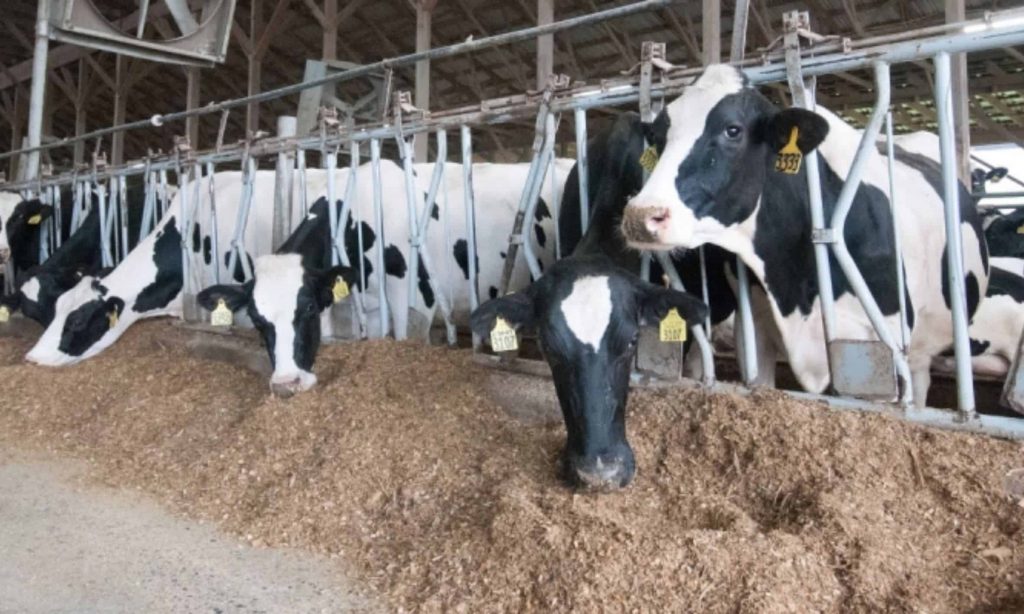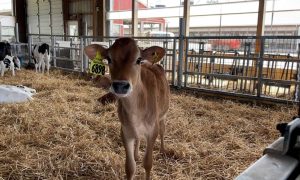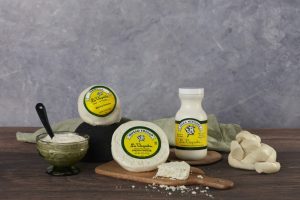
It’s no secret to dairy farmers that dairy cows prefer cooler weather. As the spring weather heats up, now is a good time to make sure you’re prepared to keep cows cool during warmer temperatures.
A dairy cow’s thermoneutral zone is in the range of 40 to 70˚F. As temperatures increase, dairy cattle can become heat stressed and this can negatively affect milk production and somatic cell counts. Higher temperatures and environmental stress can cause elevated somatic cell counts (SCC).
A cow giving 120 pounds of milk per day generates about 6,300 British Thermal Units (BTU) per hour of heat. Compare that to a cow producing only 40 pounds of milk per day which generates 3,300 BTU per hour. That’s a big difference between a high and low-producing cow. Higher-producing cows are even more susceptible to heat stress. It’s been shown that high-producing dairy cows could experience heat stress when the Temperature Humidity Index is 68˚F or greater. And as humidity increases, an average-producing dairy cow could become heat stressed at 72˚F.

Dairy farmers can help reduce heat stress within their herds with some simple management practices. The following are some steps to help minimize heat stress and help maintain milk production during warmer months:
- Be sure to clean barn fans. Fans and sprinklers are effective tools to help keep cows cool. But dirty, dusty fans won’t run as efficiently as clean fans. Dust buildup of 1/8-inch on blades can decrease fan efficiency by as much as 40%. Keeping fans clean is important to ensure the effectiveness of the ventilation system so cows stay cool and comfortable.
- Provide plenty of fresh, clean water. Cows drink about 50% more water when the temperature is 80˚F versus 40˚F. They need water to cool themselves through increased respiration and perspiration. Watering stations should be in convenient locations to allow for multiple cows to access the water and keep up with water demand. If cows are housed in tie-stalls, be sure to clean out water bowls frequently to keep them free of feed and debris.
- Avoid vaccinations during hot weather to minimize added stress.
- Feed during cooler times of the day. During warmer weather, feed intake will likely drop off. Some estimates show that for every one pound decrease in dry matter intake, 2 pounds of milk production are lost.
- Provide shade as much as possible and if cows are milked in a parlor, limit time in the holding pen.
Monitoring dairy records can also be helpful to determine if hot weather is impacting cow performance. Signs of heat stress will show up in the following ways:
- Reduced milk production – Use daily milk weights to look for drops in milk production of more than five pounds per cow per day during warmer weather. It’s not recommended to use monthly tests as the impact of heat stress can come and go between tests.
- Decrease in conception rates – Look for a decline in conception rate of five points or more during the summer months compared to the annual average conception rate.
- Increase in lameness – Monitor hoof health records for an increase in lameness rates two months after the main heat stress period, which is usually observed in early fall. When cows are heat stressed, they tend to bunch together or stand up which can affect hoof health.
Keeping cows cool and comfortable can be challenging during warmer temperatures. But by putting management practices in place to mitigate heat stress, you can help your herd maintain production and stay healthy.
If you have questions or would like more information, contact Daniela Roland, the Franklin County Dairy Educator at 717-263-9226 or djr6158@psu.edu.
![Peanut Butter Doesn’t Pretend, Unlike Plant-Based Milk [Opinion] 2 Peanut Butter Doesn’t Pretend, Unlike Plant-Based Milk [Opinion]](https://en.edairynews.com/wp-content/uploads/2023/04/Peanut-Butter-Doesnt-Pretend-Unlike-Plant-Based-Milk-Opinion-150x150.jpg)





















